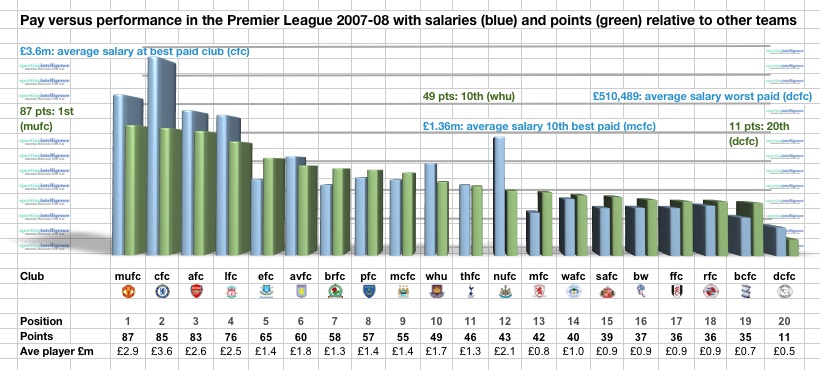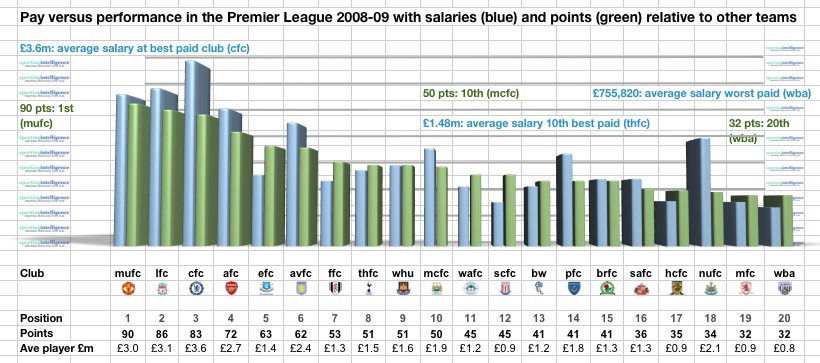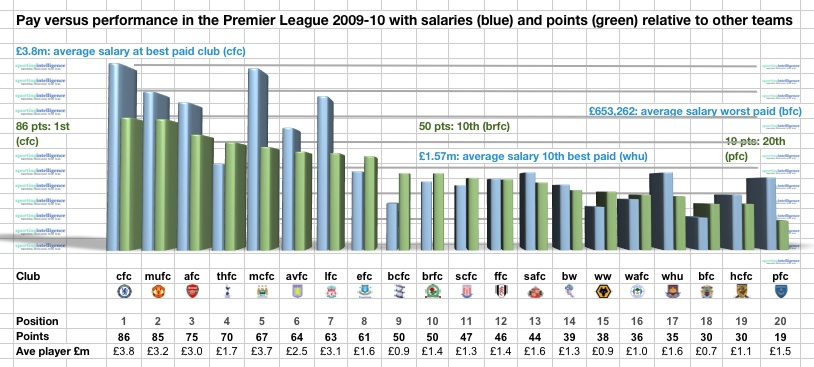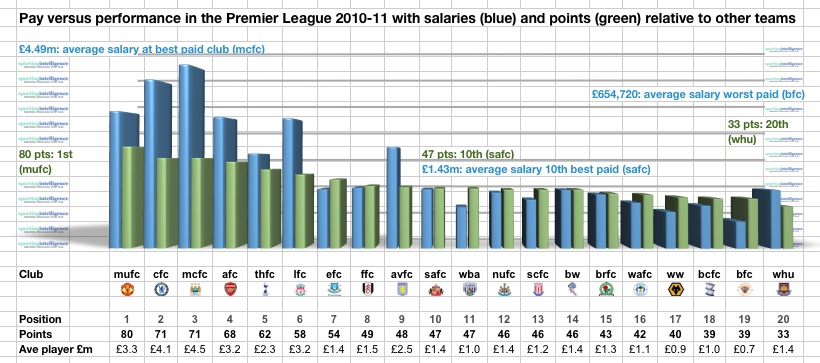By Nick Harris
SJA Internet Sports Writer of the Year
14 May 2012
Money has helped to fuel success as long as the English football league has existed – so that’s about 124 years.
So while saying that Manchester City bought the 2011-12 Premier League title is true (they would not have done it without that cash), it’s no truer than saying Manchester United spent a lot of money to win their 12 Premier League titles.
Chelsea too spent a lot of money to win their three Premier League titles, and Arsenal spent a decent whack to win their three (yes they did) and Blackburn under Jack Walker were also financially ‘doped’, to use today’s parlance.
Of course there is a debate to be had about the source of the funds, and the magnitude, and umpteen other political considerations. And that debate will be long and fierce.
But is has been true from more than 100 years that ‘big’ clubs, with big crowds, paying more gate money, have won more often.
Sportingintelligence‘s resident statistician Brian Sears looked today at the relationship between crowds and titles, and a more detailed piece might follow. But his headline finding was that 45 English title winners of the 66 post-war seasons (68 per cent) had crowds that were either the biggest in England, the second biggest or the third biggest.
That illustrates, in the most basic way, that ‘big’ clubs have long had more fans and more money, and hence attracted better players, who have a greater chance of winning. It shows, in the most basic way, that money has long equated to success; or at least played a large part.
As the latest part in an ongoing series of studies that consider the relationship between pay and performance in different global leagues (arising from our global salaries survey CLICK HERE for details), below we show the rise and rise of Manchester City in the Mansour era, and how it is directly attributable to money.
Specifically we look at the relationship between wages and success. Let’s start with the final season before Mansour took over, 2007-08.
This is the graphic story of who was paying what in wages, and how it impacted on the league table (article continues below).
.
.
Note that Chelsea are the league’s highest payers with an average first-team salary of £3.6m, and the other big payers were Manchester United, Arsenal and Liverpool. That quartet filled the top four places.
At a glance we can see the strong correlation between pay (blue) and performance (green).
The highest payers thrive. The lowest payers bomb out. Look at Derby’s small wages and piddling amount of points.
When the blue column towers over the green, the team’s performance isn’t matching its outlay on wages. Chelsea and notably Newcastle weren’t doing as well as the cash said they should. Middlesbrough (in 13th place) and Everton (in fifth) were doing better than the money said.
It’s clear that the money talks. Look at City, finishing ninth in the table with wages ranked 10th in the division. Pretty much exactly where you’d expect.
Now on to the first season of the Mansour regime, 2008-09:
.
City’s wage bill is starting to climb. They actually finish a place lower than the previous season, but as with Chelsea in 2003-04 in the first year of Abramovich’s cash, it takes time to make an impact. But if it’s sustained, it does.
The general pattern remains strongly indicative of money fueling success. The big payers are at the top of the table. Liverpool are No2 payers and finish second behind winners Manchester United (No3 payers) and ahead of Chelsea (top payers). Everton are still punching above their weight. Villa’s big spending is helping them up the table. They might reasonably have expected to be one place higher, but only one.
At the other end, low payers West Brom, Middlesbrough and Hull all struggle but it is Newcastle who go down thanks to rank bad management (of the club if not the team).
While wages will have a large effect on performance, it remains gloriously reassuring they’re ‘only’ about 85 per cent significant to final outcome in the last 10 years in the Premier League. A great manager can help his team punch higher. A bad one or poor stewardship by an owner can lead a club to under-achieve.
And so to Mansour’s second full season, 2009-10:
.
The cash is starting to work. City are now No2 payers and have risen to fifth in the table. Three other big spenders – Chelsea, United and Arsenal – fill the top three places, and a fourth, Liverpool, punch well below their weight with that big wage bill they hoped would win the title the previous season.
Spurs have started to spend a bit a climb. Villa are the sixth highest payers and sixth in the table. Everton are still doing better than they should, and Birmingham even more so. At the other end, Portsmouth are spending far too much for far too little in performance terms and the first signs are there that West Ham are heading the same way.
And so to last season, 2010-11, the third season of City’s Sheikh:
City are now the highest payers and have finished higher again, third this time. United and Chelsea and Arsenal are the other three biggest payers and fill the top four. Liverpool continue to underachieve. Villa do, just as shockingly when you consider they are still spending so much money. West Brom are punching well above their weight, and Blackpool too (though it’s not quite enough, just).
We don’t know the full extent of clubs’ wage expenditure for 2011-12.
But City’s wages have been the highest. It’s not the only reason they won the title. But it’s a significant one, part of a long old story.
.
World’s BEST PAID sports teams / More articles mentioning salaries in sport
Follow SPORTINGINTELLIGENCE on Twitter
Sportingintelligence home page










